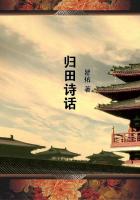It is the secret sympathy, The silver link, the silken tie, Which heart to heart and mind to mind, In body and in soul can bind."Truth and faith, courage and chivalry, a free life in the hills and by the streams, a shrewd brain, an open heart, a kind word for friend or foeman, these are what you learn from the "Lay," if you want to learn lessons from poetry. It is a rude legend, perhaps, as the critics said at once, when critics were disdainful of wizard priests and ladies magical. But it is a deathless legend, I hope;it appeals to every young heart that is not early spoiled by low cunning, and cynicism, and love of gain. The minstrel's own prophecy is true, and still, and always, "Yarrow, as he rolls along, Bears burden to the minstrel's song."After the "Lay" came "Marmion, a Tale of Flodden Field." It is far more ambitious and complicated than the "Lay," and is not much worse written. Sir Walter was ever a rapid and careless poet, and as he took more pains with his plot, he took less with his verse. His friends reproved him, but he answered to one of them -"Since oft thy judgment could refine My flattened thought and cumbrous line, Still kind, as is thy wont, attend, And in the minstrel spare the friend:
Though wild as cloud, as stream, as gale, Flow forth, flow unrestrained, my tale!"Any one who knows Scott's country knows how cloud and stream and gale all sweep at once down the valley of Ettrick or of Tweed. West wind, wild cloud, red river, they pour forth as by one impulse--forth from the far-off hills. He let his verse sweep out in the same stormy sort, and many a "cumbrous line," many a "flattened thought," you may note, if you will, in "Marmion." For example -"And think what he must next have felt, At buckling of the falchion belt."The "Lay" is a tale that only verse could tell; much of "Marmion"might have been told in prose, and most of "Rokeby." But prose could never give the picture of Edinburgh, nor tell the tale of Flodden Fight in "Marmion," which I verily believe is the best battle-piece in all the poetry of all time, better even than the stand of Aias by the ships in the Iliad, better than the slaying of the Wooers in the Odyssey. Nor could prose give us the hunting of the deer and the long gallop over hillside and down valley, with which the "Lady of the Lake" begins, opening thereby the enchanted gates of the Highlands to the world. "The Lady of the Lake," except in the battle-piece, is told in a less rapid metre than that of the "Lay," less varied than that of "Marmion." "Rokeby" lives only by its songs; the "Lord of the Isles" by Bannockburn, the "Field of Waterloo" by the repulse of the Cuirassiers. But all the poems are interspersed with songs and ballads, as the beautiful ballad of "Alice Brand"; and Scott's fame rests on THESE far more than on his later versified romances. Coming immediately after the very tamest poets who ever lived, like Hayley, Scott wrote songs and ballads as wild and free, as melancholy or gay, as ever shepherd sang, or gipsy carolled, or witch-wife moaned, or old forgotten minstrel left to the world, music with no maker's name. For example, take the Outlaw's rhyme -"With burnished brand and musketoon, So gallantly you come, I read you for a bold dragoon That lists the tuck of drum.
I list no more the tuck of drum, No more the trumpet hear;But when the beetle sounds his hum, My comrades take the spear.
And, oh, though Brignal banks be fair, And Greta woods be gay, Yet mickle must the maiden dare, Would reign my Queen of May!"How musical, again, is this! -"This morn is merry June, I trow, The rose is budding fain;But she shall bloom in winter snow, Ere we two meet again.
He turned his charger as he spake, Upon the river shore, He gave his bridle-reins a shake, Said, 'Adieu for evermore, My love!
Adieu for evermore!'"
Turning from the legends in verse, let it not be forgotten that Scott was a great lyrical poet. Mr. Palgrave is not too lenient a judge, and his "Golden Treasury" is a touchstone, as well as a treasure, of poetic gold. In this volume Wordsworth contributes more lyrics than any other poet: Shelley and Shakespeare come next;then Sir Walter. For my part I would gladly sacrifice a few of Wordsworth's for a few more of Scott's. But this may be prejudice.
Mr. Palgrave is not prejudiced, and we see how high is his value for Sir Walter.
There are scores of songs in his works, touching and sad, or gay as a hunter's waking, that tell of lovely things lost by tradition, and found by him on the moors: all these--not prized by Sir Walter himself--are in his gift, and in that of no other man. For example, his "Eve of St. John" is simply a masterpiece, a ballad among ballads. Nothing but an old song moves us like -"Are these the links o' Forth, she said, Are these the bends o' Dee!"He might have done more of the best, had he very greatly cared.
Alone among poets, he had neither vanity nor jealousy; he thought little of his own verse and his own fame: would that he had thought more! would that he had been more careful of what was so precious!
But he turned to prose; bade poetry farewell.
"Yet, once again, farewell, thou Minstrel Harp, Yet, once again, forgive my feeble sway.














